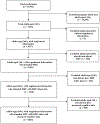Vitamin B-12 malabsorption and renal function are critical considerations in studies of folate and vitamin B-12 interactions in cognitive performance: NHANES 2011-2014
- PMID: 35584808
- PMCID: PMC10961698
- DOI: 10.1093/ajcn/nqac065
Vitamin B-12 malabsorption and renal function are critical considerations in studies of folate and vitamin B-12 interactions in cognitive performance: NHANES 2011-2014
Abstract
Background: Cognitive health is a public health concern among older adults. Dietary supplement (SUP) use is common and concerns have been raised about high folic acid intake among those with vitamin B-12 deficiency and exacerbation of poor cognitive performance (PCP).
Objectives: We evaluated SUP use, usual folic acid intake, and blood folate and vitamin B-12 concentrations in relation to cognitive performance.
Methods: We used NHANES 2011-2014 data on adults aged ≥60 y (n = 2867) and estimated total usual folic acid intake from diet and supplements, vitamin B-12 intake from SUPs, blood folates, vitamin B-12 concentrations, vitamin B-12 insufficiency (≤258 pmol/L), high folate (serum folate ≥59 nmol/L or RBC folate ≥1609 nmol/L), and PCP (<34 on the Digit Symbol Substitution Test). We assessed folate distributions adjusted for multiple variables, including renal function.
Results: Compared with persons without PCP, adults with PCP were less likely to use supplements containing folic acid (mean ± SEE: 34.4% ± 2.4%) or vitamin B-12 (mean ± SEE: 47.5% ± 1.6%). Among vitamin B-12-insufficient adults, 18.0% ± 1.6% (mean ± SEE) reported taking a vitamin B-12 supplement. Among participants with high folate and insufficient vitamin B-12 concentrations, 34.3% ± 11.5% (mean ± SEE) reported taking vitamin B-12-containing supplements. Persons with high folate and normal vitamin B-12 concentrations had lower odds of PCP [aOR (adjusted odds ratio): 0.61; 95% CI: 0.45, 0.83] than persons with normal folate and vitamin B-12. Persons with high folate and normal methylmalonic acid (MMA) had lower odds of PCP (OR: 0.56; 95% CI: 0.40, 0.78) than those with normal folate and MMA concentrations. After adjustment for renal function, elevated risk of PCP was attenuated among persons with high folate and MMA. Concurrent high folate and insufficient vitamin B-12 concentrations were not associated with PCP.
Conclusions: Differential associations between vitamin B-12 and MMA highlight the need to consider renal function in studies of high folate and low vitamin B-12 status. Consumption of vitamin B-12 supplements concurrent with low vitamin B-12 status may indicate vitamin B-12 malabsorption.
Keywords: folic acid; kidney dysfunction; malabsorption; older adults; poor cognitive performance; supplements; vitamin B-12.
Published by Oxford University Press on behalf of the American Society for Nutrition 2022.
Conflict of interest statement
The authors’ responsibilities were as follows—KSC: initiated the project; KSC and LFY: designed the research and had primary responsibility for the final content; MES, CER, and YPQ: conducted the research and analyzed the data; MES: wrote the initial draft of the paper; KSC, LFY, CER, YPQ, and CAT: contributed to revisions; and all authors: read and approved the final manuscript. The authors report no conflicts of interest.
Figures
Comment in
-
Muddy water: Additional observational data cannot aid in determining whether there is a physiological interaction between low vitamin B12 and high folate in cognitive health.Am J Clin Nutr. 2022 Jul 6;116(1):5-6. doi: 10.1093/ajcn/nqac095. Am J Clin Nutr. 2022. PMID: 35585669 No abstract available.
References
-
- NIH National Institute on Aging (NIA). Cognitive health and older adults: reduce risks to cognitive health[Internet]. Bethesda (MD): NIH NIA; 2020. [Accessed January 2020]. Available from: https://www.nia.nih.gov/health/cognitive-health-and-older-adults#reduce%....
-
- Yaffe K. Modifiable risk factors and prevention of dementia: what is the latest evidence? JAMA Intern Med 2018;178(2):281–2. - PubMed
-
- Anderson LA, McConnell SR. Cognitive health: an emerging public health issue. Alzheimers Dement 2007;3(2S, 2 Suppl):S70–3. - PubMed
MeSH terms
Substances
Grants and funding
LinkOut - more resources
Full Text Sources


